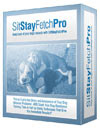Summer is a great time of year for you to enjoy the outdoors with your dog. Whether a hike along a trail, a trip to the beach, mountains, or a stroll through the neighborhood, you'll want to be sure to take precautions to keep your dog safe.
Here's a few tips for you and Fido:
o Never leave your dog alone in a car, even with the windows open. Parked cars, trucks or any vehicle can rapidly become a oven on a hot summer day, over heating and even killing your dog.
In most places it is now illegal to leave your dog in a hot car.
It is of little help to parking in the shade as temperatures inside a vehicle will still rise, especially as the sun will shift direction throughout the day.
Be on the alert for heatstroke. Heatstroke is an emergency condition that manifests itself through symptoms such as:
1. Panting
2. Looking ahead with a blank expression
3. Nervous expression
4. Will not respond to commands
5. Dry, hot skin
6. Fever
7. Fast heartbeat
8. Vomiting
9. Collapse
If you suspect heatstroke call a veterinarian immediately, then apply wet cool towels to the hairless areas of the body. This may help lower your dog's temperature and give you precious time to get to a veterinarian. Even if your dog responds you must go to the vet as a relapse is quite common and can be fatal if not properly treated.
No matter where you live, it's a crime or should be to abuse your pooch by risking his life. Check with your local legislators and humane societies and see if the place you live has such a law.
o Keep fresh cold water and a clean dish handy for your dog whenever you take him outdoors during the summer.
o Don't insist that your dog do any strenuous exercise after eating in hot, humid weather. The best time of day for exercise is in the early morning or evening, and keep walks to a minimum, especially if your dog is not in shape.
o Never let your dog stand on hot pavement or asphalt. Any dog can get hot in a flash causing sensitive paw pads to burn.
o Make sure that there are no open, unscreened windows or doors in your home through which animals can fall or jump.
o Monitor your dog's sun exposure. Dogs can suffer from sunburn, especially short-haired dogs and those with pink skin and/or white hair. Use sun block on his ears and nose a half hour before going outside.
o When visiting the beach, ask the lifeguard about water conditions and whether there are jellyfish and sea lice, which can be dangerous to dogs.
o Be careful not to allow your pooch to drink too much ocean or pool water which can make him ill.
o Salt and other sea minerals can cause damage to Fido's coat. Make sure to rinse him off with fresh water after any dip in the ocean.
o Never throw your dog into the water.
o Most dogs can swim, but not all. Perform a test to see if he can swim by standing close to your dog in shallow water and calling him. Observe his actions. If he swims with all four legs he is on the right track. If he is paddling with only his front legs give him some help and help him float until he gets the idea and begins to use all four legs.
Be wary of his swimming too much and becoming overtired. This is not something he does every day!
o Make sure your dog wears a flotation device or life jacket when on a boat.
o Keep you dog away from any area that may have been treated with insecticides or may have a residue of coolant or other vehicle sourced chemicals.
Here's a short list of plants which are highly poisonous to dogs and can be fatal. I've noted some of the most prevalent symptoms. If you suspect your dog may have been poisoned, call your veterinarian without delay !.
Azalea- vomiting, diarrhea, hyper salivation, weakness, coma.
Crocus - Excessive salivation, abdominal pain, diarrhea, vomiting, tremors, convulsions, seizures
Rhododendron Vomiting, diarrhea, hyper salivation, weakness, coma.
American Bittersweet - Weakness, convulsions, vomiting, diarrhea.
Clematis -Vomiting, diarrhea, oral ulcers
Daffodil- Severe digestive disorders, convulsions, shivering, muscle tremors.
Foxglove -Vomiting, diarrhea, weakness, cardiac failure
Lily of the Valley- Vomiting.
Narcissus- Digestive disorders, convulsions, shivering, muscle tremors
Morning Glory - Seeds can induce hallucination, diarrhea
o Carry the phone number for your veterinarian. Call them immediately if you think that your dog has ingested poison.
o Keep Fido brushed, groomed and clip heavy coats to ward off summer skin problems.
o Ask your veterinarian to recommend a safe program to combat fleas and ticks and whether a heartworm test is advisable
o Be certain that Fido has identification such as an ID tag best coupled with a microchip.
o Leashes are actually safety devices and can help prevent your dog from getting hit by a car, being attacked by another dog or animal and being severely hurt.
o Make sure to keep a first aid kit for Fido handy in case an emergency arises
o Keep Fido indoors. Dogs can overheat quickly even in shaded areas, so it is recommended to keep them indoors as a best option. Whenever your dog is outside, be sure to monitor him closely.
Here's wishing you and your dog a fun and safe summer!
We are dedicated to helping dogs live happier healthier lives as our companions and friends. For more information on dog care, behavior and nutrition visit us at Dogs 4 Life today. Adopt a dog, Save a Life http://www.Dogs-4Life.com
Article Source: http://EzineArticles.com/?expert=M._Bruno
Tuesday 8 June 2010
Subscribe to:
Posts (Atom)
